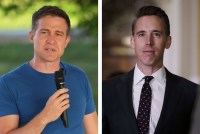Latest KFF Health News Stories
Doctors Urging Conference Boycotts Over Abortion Bans Face Uphill Battle
A famed breast cancer surgeon has created a California alternative to a major Texas event. Yet many doctors believe boycotting medical conferences in states that criminalize abortion accomplishes nothing and can be harmful.
Democratic Hopefuls Fault GOP Incumbents for Anti-Abortion Records in Congress
Democratic congressional hopefuls in California are highlighting the anti-abortion records of vulnerable Republican incumbents, many of whom have moderated their stances ahead of the election. With control of the U.S. House at stake, Democrats hope to convince voters that their candidates will do more to protect women’s health.
A medida que se acerca el día de las elecciones, los aspirantes demócratas están haciendo todo lo posible para vincular a sus oponentes republicanos en distritos congresionales disputados con sus antecedentes antiaborto.
As Record Heat Sweeps the US, Some People Must Choose Between Food and Energy Bills
An increasing number of Americans struggle with energy poverty, the inability to adequately heat or cool one’s dwelling. Health officials and climate experts are sounding the alarm as record-breaking heat sweeps the nation.
What the Health? From KFF Health News: Let the General Election Commence
Abortion and reproductive health issues headlined the Democratic National Convention in Chicago, as expected. But what Vice President Kamala Harris has in mind for other health policies as the Democratic nominee remains something of a mystery. Meanwhile, former President Donald Trump says he would not use the 19th-century Comstock Act to impose, in effect, a national ban on abortion, which angered his anti-abortion backers. Alice Miranda Ollstein of Politico, Joanne Kenen of Politico and Johns Hopkins University, and Shefali Luthra of The 19th join KFF Health News’ Julie Rovner to discuss these stories and more. Also this week, Rovner interviews KFF Health News’ Tony Leys, who reported and wrote the latest KFF Health News-NPR “Bill of the Month” feature about a woman who fought back after being charged for two surgeries despite undergoing only one.
En medio de las expulsiones de Medicaid, muchos estados deciden expandirlo
Esta ampliación de las afiliaciones en estos estados se producen en medio de la mayor conmoción en las casi seis décadas de historia del programa.
Amid Medicaid ‘Unwinding,’ Many States Wind Up Expanding
The end of pandemic-era Medicaid coverage protections coincided with changes in more than a dozen states to expand coverage for lower-income people, including children, pregnant women, and the incarcerated.
Urgent Care or ER? With ‘One-Stop Shop,’ Hospitals Offer Both Under Same Roof
Hospitals in several states are partnering with a private equity-backed company to offer combined emergency and urgent care in a single building. But patients may not realize prices vary between the two services — often by a lot.
Planned Parenthood to Blitz GOP Seats, Betting Abortion Fears Can Sway Voters
The reproductive rights organization hopes to oust GOP incumbents from key California congressional seats by highlighting the possibility of a national abortion ban. A state Republican official calls it a swing and a miss, noting that, under Democrats, hospitals have closed maternity wards and filed for bankruptcy.
Planned Parenthood enfrenta a los republicanos y espera captar el apoyo de los votantes
Esta ofensiva estratégica es parte de un esfuerzo nacional más amplio del grupo de derechos reproductivos, que se propone evitar que una mayoría republicana apruebe restricciones al derecho al aborto, incluida una prohibición nacional.
Republicans Are Downplaying Abortion, but It Keeps Coming Up
Torn between a base that wants more restrictions on reproductive health care and a moderate majority that does not, it seems many Republicans would rather take an off-ramp than a victory lap when it comes to abortion. But they can’t escape talking about it.
How Two States Reveal a Deeper Divide on Insuring Kids’ Health
Arizona and Florida lawmakers saw trouble ahead for children in 2023, with states slated — as the covid-19 pandemic waned — to resume disenrolling ineligible people from Medicaid. So, legislators in both states voted to expand a safety net known as the Children’s Health Insurance Program, or CHIP, which covers those 18 and younger in […]
A Tale of Two States: Arizona and Florida Diverge on How To Expand Kids’ Health Insurance
Both Florida and Arizona want to expand eligibility for the Children’s Health Insurance Program, known as CHIP, but their approaches to charging low-income families premiums for the coverage showcase the nation’s ideological divide on helping the disadvantaged.
Leyes que protegen a trabajadores de California del calor extremo ayudarían a estudiantes
Estas mismas normas se extenderán a las escuelas, donde profesores, conserjes, quienes atienden las cafeterías y otros empleados suelen trabajar sin aire acondicionado, igual que sus alumnos.
Heat Rules for California Workers Would Also Help Keep Schoolchildren Cool
Proposed state standards to protect indoor workers from extreme heat would extend to schools. The rules come as climate change is bringing more frequent and intense heat waves, causing schools nationwide to cancel instruction.
Medics at UCLA Protest Say Police Weapons Drew Blood and Cracked Bones
In contrast to police statements, volunteer medics said they treated serious wounds as UCLA’s pro-Palestinian protest was besieged by police and counterprotesters, including some injuries that appeared to be caused by “less lethal” projectiles fired by cops.
La protesta de la UCLA, que reunió a miles de personas que se oponen a los continuos bombardeos de Israel sobre la Franja de Gaza, comenzó en abril y alcanzó un peligroso crescendo en mayo, cuando manifestantes pro Israel y la policía se enfrentaron a los activistas y a los que los apoyaban.
Tribal Nations Invest Opioid Settlement Funds in Traditional Healing To Treat Addiction
Hundreds of Native American tribes are getting money from settlements with companies that made or sold prescription painkillers. Some are investing it in sweat lodges, statistical models, and insurance-billing staffers.
Democrats Seek To Make GOP Pay for Threats to Reproductive Rights
Democrats running for office are using abortion rollbacks to galvanize voters, with abortion rights ballot initiatives amplifying their lines of attack. In Missouri, the leading Democratic candidate for the Senate also blames Republican Sen. Josh Hawley for threatening access to IVF.
Medical Residents Are Increasingly Avoiding States With Abortion Restrictions
A new analysis shows that students graduating from U.S. medical schools were less likely to apply this year for residency positions in states with abortion bans and other significant abortion restrictions.





















